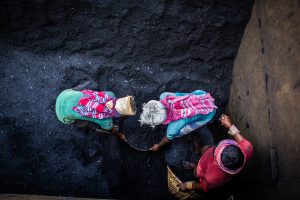Six months after Bangladesh was born anew, the country is emerging from the ashes facing the rising sun of Japan enforcing dependence on outdated fossil fuels dressed up as foreign aid.
Bangladeshis are living in hope. The country’s interim government is led by Dr. Muhammad Yunus, who was awarded a Nobel Prize for his microfinance work alleviating poverty, after student protests spearheaded the ousting of the 17-year-long Sheikh Hasina government. Following the turmoil, Japan has reinforced its commitment to “Bangladesh 2.0.”
Japan has been the biggest bilateral aid provider and ally to Bangladesh’s nation-building for 50 years and claims a relationship “based on mutual trust, respect, friendship, and cooperation.” No wonder Japan was entrusted with formulating Bangladesh’s energy plans — first in 2010 and every iteration since, including the 2023 Integrated Energy and Power Master Plan. This plan, however, pushed Bangladesh to invest in outdated coal power plants and imported gas facilities, and rely on unproven technologies such as carbon capture and storage.
The winners from this energy plan are not the people of Bangladesh but Japan’s energy giants like JERA, Sumitomo Corporation, and Mitsubishi Corporation, which have dedicated fossil fuel businesses that are worsening global warming.
Millions of Bangladeshi people have been at the frontline of the climate crisis, losing their homes and livelihoods to more frequent extreme flood and cyclone events. Bangladeshis also face the consequences of Japan’s dangerous fossil fuel expansion plans.
Cast as Japan’s single largest aid project to date, the 1,200-megawatt Matarbari coal power plant in southeastern Bangladesh cost a whopping $6 billion and employed Japanese companies as engineering, procurement, and construction contractors.
Since construction started on Matarbari, there have been significant human rights breaches for people in the coastal communities of Chattogram. Communities have been outraged by inadequate compensation for losing their homes and livelihoods.
Matarbari has been so controversial that the governments of both Bangladesh and Japan were compelled to cancel a second massive polluting new power plant.
Most shocking is that the Matarbari coal plant loan is considered “climate finance” by Japan. The coal project would add 167 million tonnes of carbon dioxide over its operational years, according to the Global Energy Monitor, equivalent to driving 39 million petrol cars for one year.
Japanese gas companies have forced their way into Bangladesh’s energy and power sectors, and often contributed to the country’s dependence on expensive, imported gas, making it vulnerable to volatile international liquefied natural gas (LNG) prices.
JERA bought 22 percent of Summit Power International, Bangladesh’s largest independent power producer which owns gas power plants and import LNG terminals. This could enable Japan to sell its surplus LNG imports to Bangladesh. Summit is under investigation by Bangladesh authorities.
True friends don’t harm each other. Yet Japan has locked Bangladesh into decades of pollution and plunged the economy into relying on expensive coal and LNG imports, resulting in sweeping blackouts for many of the country’s 170 million people.
The scope of renewable energy is downplayed in Bangladesh’s 2023 power master plan. The plan inflates future energy demand and proposes that by 2050, when the world aims for net zero emissions to limit harmful global warming, just 12–17 percent of Bangladesh’s electricity will come from renewable energy sources including wind and solar.
It’s a missed opportunity for Japan, as Bangladesh has the potential to generate 240 GW of solar power and over 30 GW of wind power, according to a recent Market Forces report. More investment is urgently needed in renewable energy, transmission and storage.
Japan has backed some green finance, climate mitigation and adaptation projects in Bangladesh. A $90 million loan agreement ruled out coal, oil and gas, and promoted renewables, but it’s minuscule compared to the additional $1.5 billion that went to Matarbari that same year, classed as “aid.”
However, the Japan-Bangladesh relationship is turning a corner. Bangladesh’s interim government is sending loud signals to Japan about energy transition. The Yunus-led government has canceled a floating LNG import terminal proposed by JERA-backed Summit, on the grounds of favoritism and lack of transparency. A massive new LNG onshore import terminal has been canceled, which listed big Japanese companies as bidders, among international oil and gas giants. Investments are being encouraged in renewable energy. A massive 1.78 gigawatts solar tender was launched last month.
Japan’s biggest energy companies have the capability and must back the renewables boom. Japan’s electricity giant JERA has revealed it aims to develop 20 GW of renewable energy by 2035, but mainly in Europe and the United States.
Bangladesh 2.0 is showing positive signs of finally embracing a faster transition away from coal and imported LNG, towards renewable energy. It makes good sense to achieve energy sovereignty and economic prosperity for the people of Bangladesh.
It’s critical that Japan acts like a true friend rather than aiming to profit from its relationship. Amid more deadly heatwaves and severe floods, Bangladesh deserves a safer future backed by clean energy. Wealthy nations like Japan have a duty to aid a renewable energy revolution while enabling their companies to flourish.

































